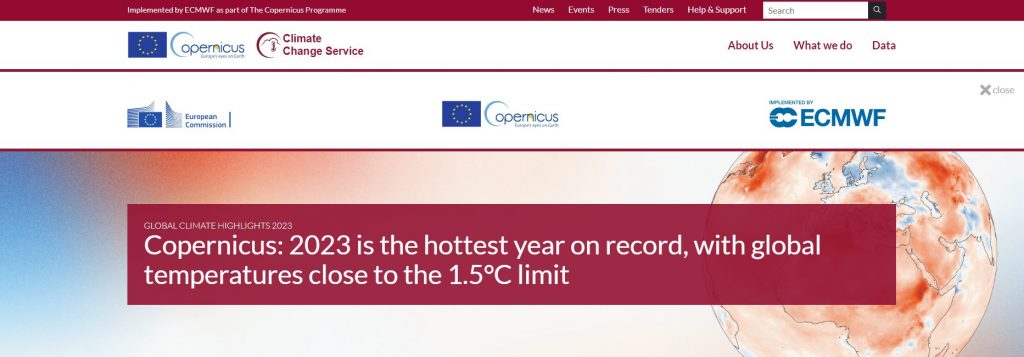This January has seen some of the hottest temperatures ever recorded on the planet. The United Kingdom recorded its highest ever January temperature of 19.9°C in northern Scotland and the UK is not alone. Across the planet records are being broken in Africa, Australia, South America and Asia and in the northern hemisphere winter feels like spring or early summer. This follows confirmation that 2023 was the hottest year ever recorded since records began, overtaking the last hottest year on record in 2016. Daily global temperature averages briefly exceeded pre-industrial levels by more than 2°C and the world is fast approaching the 1.5°C critical target, with levels reaching 1.48°C above pre-industrial level. 2024 is widely expected to be the year planetary temperatures exceed the 1.5°C increase, setting in train a growing number of floods, droughts and storm events that create devastating impacts on the people affected.
16 years ago, in 2007, Lord Stern an economist laid out the stark economic reality for the UK Government why early and rapid action was needed on climate change. We did not listen to the clear signals the data gave us, and today face the economic consequences and human misery that follow climate change induced weather events.
“Climate change is here. It is terrifying. And it is just the beginning. The era of global warming has ended; the era of global boiling has arrived. The air is unbreathable. The heat is unbearable. And the level of fossil fuel profits and climate inaction is unacceptable. Leaders must lead. No more hesitancy. No more excuses. No more waiting for others to move first. There is simply no more time for that”.
The question is are our leaders listening or like Nero do they “fiddle whilst Rome burns.”
COP28 was a great opportunity to finally break the tie with fossils fuels, the prime driver of climate change, to signal an end to an era. Did COP28 live up to its billing or did our leaders “fiddle whilst the planet burns”.
What were the key achievements of COP28:
- A commitment to phase out fossil fuels– “Transitioning away from fossil fuels in energy systems, in a just, orderly and equitable manner, accelerating action in this critical decade, so as to achieve net zero by 2050 in keeping with the science”;
- The establishment of a Loss and Damage Fund for the effects of Climate Change to be administered by the World Bank and pledges in Dubai of over $650 million;
- Progress on the Climate Finance Target building on the $100 billion pledged by developed nations to finance climate mitigation and adaption initiatives in developing countries;
- Calls to double adaption finance and plans for assessments and monitoring of adaptation needs in the coming years;
- Global stocktake of Fossil Fuels, with the aims of peak global emissions between 2020-2025, emissions reduction consistent with 1.5°C rise in temperatures and net zero by 2050;
- Recognition of the need for a just transition from fossil fuels and of the need for ecosystem-based adaptation and nature based solutions.
International Agreements by their very nature demand compromise, but in the face of the need for giant steps forward for mankind, COP28, in effect delivered incremental change. It did not reflect the urgency demanded by the accelerating disaster of climate change. In many ways COP28 finally recognised the problems that are obvious to society, that we will not tackle climate change till we phase out fossil fuels and prevent further development that only accelerates climate change. Every major investment made today in oil and gas will be justified on a 20-25 year development time frame and will only make matters worse.
As a former senior oil manager for both BP and Chevron I can see that COP28 has done little to signal other than business as usual for major oil and gas companies who continue to generate record profits at the expense of the planet. It makes it more difficult for voices of change to be heard within Corporate Boardrooms (see Guardian article) driven by the need to deliver shareholder return. Until fossil fuel companies are required to pay for the damage their products create or consumers signal a strong move away from fossil fuels in their daily lives, change will be far too slow to match the crying needs of the planet. It is always money that drives real change, so forget the words and follow the money!
This is where citizen science and projects like AURORA can signal how we can drive behavioural change and influence major fossil fuel companies. It is possible to heat and power our homes with renewable energy, it is possible to reduce our energy demands, we can switch to electric vehicles and we can reduce our consumption of plastics derived from fossil fuels. Fossil Fuel companies can only make exorbitant profits if we the consumer continue to buy their products.
A first step in changing our behaviours is to understand what carbon we produce. The AURORA Energy Tracker App is a tool everyone can use for that purpose. You can measure:
- The energy you use to heat your home and the carbon emissions you produce;
- The electricity you use to power your home and the carbon emissions you produce;
- The fossils fuels you user to power your transport and the carbon emission you produce.
I stress above “the carbon emissions you produce”. With that knowledge you can check if you are on track to meet the Paris Agreement’s central target to limit climate change to 1.5°C and if not you can get advice on how to change. This is the way to take personal responsibility so you can tell your grandchildren “I did not stand by and do nothing; I played my part in tackling climate change”. You may also be surprised that in the process you will save money on your ongoing costs. I know, I have saved carbon, and I do save money.
Using the AURORA Business Models you can create community power schemes to divert profits from fossil fuels companies back into your community. Such schemes can:
- Provide renewable solar energy infrastructure at no cost to the user, through community investment schemes;
- Reduce energy costs for the user by 10-20%;
- Pay community investors at least 4% on every $ invested; and
- Still produce profits for the community power scheme provider to fund further schemes.
These are not theoretical benefits they are real, based on implemented projects on schools, Leisure Centres, Factory Buildings and Farms across Europe.
Every social innovation in our history has started with a few individuals who believe they can drive change. Be part of the change that finally forces Governments to deliver on their promises and fossil fuel companies to become renewable energy companies.
Join the climate change revolution through the AURORA project and like me enjoy the financial savings of moving towards a fossil fuel free lifestyle for heating and powering your home and in the way you transport your family.
5th February 2024
Martin Brocklehurst




